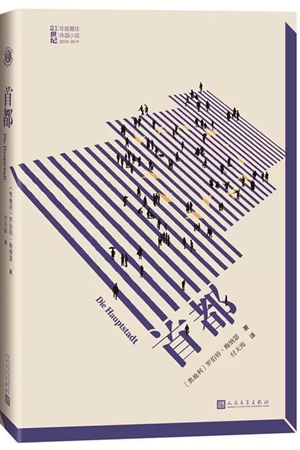HOME >> ARTS
Austrian writer wins China’s annual foreign novel award
By Bi Mengying Source:Global Times Published: 2020/3/28 21:13:40

Robert Menasse Photo: Courtesy of People's Literature Publishing House
Austrian writer Robert Menasse's The Capital won China's prestigious foreign novel award, the 21st Century Best Foreign Novel of the Year 2018-2019 and Zou Taofen Annual Foreign Fiction Award, which comes with a prize money of 50,000 yuan ($7,048), on Friday.
Originally planned to be held in Beijing, the awards resorted to an online ceremony due to the COVID-19 outbreak.
"Vienna and Beijing seem to be far away from each other. But they are not...We have become close in terms of business, or maybe politics as well… We cannot understand each other only through trade. Cultural exchanges have become extremely crucial. Giving a European novel the opportunity to earn China's important literature award, the proposal itself is already very meaningful," said 65-year-old Menasse in his video of awards speech.
The 21st Century Best Foreign Novel of the Year award was launched by one of China's largest publisers, People's Literature Publishing House and Chinese Association of Foreign Literature in 2001. The Taofen Foundation was invited for collaboration with the Zou Taofen Annual Foreign Fiction Award in 2014. More than 90 writers from over 20 countries have participated.
China has been long making efforts to promote exchanges in literature. With the pandemic affecting people across the world, furthering communication and conversations through literature has become more important than ever, Nie Zhenning, director of the Taofen Foundation, told the Global Times.
Changing stereotypes
First published in 2017 in German, The Capital was acclaimed as a first-class satire on EU bureaucracy. The book has been translated into more than 25 languages and the Chinese version was published by People's Literature Publishing House in 2019.
"This probably is the most hilarious beginning of the novels that I've read-a pig on the loose," said a post on China's Twitter-like Sina Weibo.
The book scored 8.8/10 on Chinese media review site Douban. It changed stereotypes held by Chinese readers about German literature.
"It is a thought-provoking work that combines many elements such as European history, the current situation, religion and conflicts through several masterfully organized threads. It gives Chinese readers a better understanding of Europe. Unlike most German novels, which tend to be philosophical and too deep to have a wide appeal, this book is interesting and funny," said Ouyang Tao, director of the Foreign Literature Editorial Department at People's Literature Publishing House.

Chinese version of The Capital Photo: Courtesy of People's Literature Publishing House
Interactions make a difference
In another video Menasse sent to the committee in January, he pointed out that narrative literature and novels about current events help people realize that despite different cultural backgrounds, they have so much more in common than they think.
Ouyang also noted that the lack of understanding sometimes may result in bias and discrimination, or even stigmatization.
"But there is no need to be afraid, as there is such a group of writers endeavoring to deepening mutual understanding through literature exchanges," he said.
Ouyang gave an example of the reputed German writer Martin Walser, who won the award in 2009 with his work A Man in Love. Walser first met Chinese writer Mo Yan through the award ceremony in Beijing.
When Mo won the 2012 Nobel Prize in Literature, he was faced with unsubstantiated backlash from Western media. Walser spoke up immediately and defended Mo's work as "extremely critical and very open."
In his interview with German magazine Der Spiegel in 2012, Walser recalled his pleasant conversation and "unbelievably comfortable" interaction with Mo at the award ceremony in Beijing, admitting he was not only impressed by Mo's work, but also by him as a person.
"My Chinese interpreter Huang Liaoyu translated, but time and again we enthusiastically forgot that we were speaking different languages," said Walser.
Looking back at the friendship between Mo and Walser that developed through the awards, Ouyang noted, these heart-warming interactions are truly making a difference.
He agreed with what Menasse said in his video, and they all very much looked forward to more face-to-face communications and exchanges when the pandemic ends.